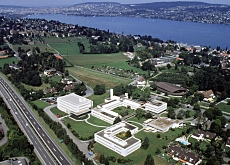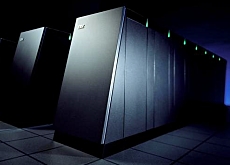IBM laboratory glimpses the future

IBM's European research centre, based just outside Zurich, is a laboratory where tomorrow's science and technology take shape.
The centre has been conducting breakthrough research for nearly 50 years, with a high point in the 1980s when its in-house scientists received Nobel prizes.
It was in 1956 that IBM decided to set up shop in Rüschlikon, a short train ride away from the city. Nestled in a residential area a few minutes from the shores of Lake Zurich, it is home to more than 250 scientists from around the world.
The American computer giant’s laboratory made headlines in 1986 and 1987 when four of its researchers earned Nobel prizes in physics for their work on scanning tunnel microscopes and superconductivity.
While things have quietened down since then, the centre continues to pursue top-of-the-range research, both basic and applied. Recently it has chosen to collaborate with customers to meet their needs more closely.
The latest example of this is the Blue Gene supercomputer deal with Lausanne’s Federal Institute of Technology. The company’s scientists will use IBM technology to work with institute researchers on projects such as mapping the brain or materials science.
Blue Gene was born out of the Deep Computing project, which aims to advance supercomputer design, software and simulations.
“Deep Computing involves the development and synergy of three components: hardware, software and algorithm design,” said Wanda Andreoni, programme manager in Zurich.
“It also involves multidisciplinary expertise such as visualisation, computer science, maths and physics.”
Biology
While most of the work has been carried out in the United States, Zurich staff have been working on developments of their own. The biological focus of the Lausanne project reflects this.
Since 1994 IBM scientists in Switzerland have been looking at computer simulations of biochemical processes. At first it was officially discouraged, as management saw no future for it within the company, which has its focus on material science.
This changed with the announcement of the Blue Gene project in 1999. But management and staff realised that decoding biology would require outside collaboration.
“I was convinced that to make an impact in biology, we had to learn from the real world,” Andreoni told swissinfo.
“And the real world was pharmaceutical companies. By working with them, we learned a lot and we were able to understand their needs.”
But Andreoni admits that there is still plenty to learn despite the development of accurate computer models of biochemical molecules. “We have a lot to do before we can say advanced computational methods will have an impact on drug design,” she added.
Nanotechnology
IBM’s research and development work focuses on a wide variety of sectors. One group is focusing on concepts for future computer chips.
As developers attempt to give chips more processing power, they need to reduce the size of semiconductors, the basic building blocks of electronic devices. But they know they will hit a brick wall by 2016 using current technology.
In Zurich, the researchers are betting on nanowire devices, with diameters less than a thousandth of a human hair. Seeing them is no problem thanks to equipment such as the scanning tunnel microscope, but finding techniques to make them reliable and reproducible is proving harder.
“Smaller sizes mean we get wide variability between what seem to be identical devices and chips,” said project leader Walter Riess.
Riess is confident that these nanoscale devices have a bright future, even if he prefers to hedge his bets. “There are no promises for the time being,” he said.
More down-to-earth research is also underway in Zurich. One such project is the Intelligent Trade Lane, which responds to heightened security fears in the transport industry.
More than 80 per cent of world trade travels aboard ships in containers, but only one in 50 containers is ever checked. To answer security concerns, researchers in Zurich have been trying to put together a package that allows officials to track the contents of a container at any time.
Besides registering data on goods supplied by shippers, the system includes wireless tracking devices that record events involving the container, such as door opening, environmental changes or location. The same tracking equipment will also receive and send data in real time.
A large-scale pilot project will begin in March.
Freedom
Research at the IBM lab – while more commercially orientated than in an academic environment – is not restrictive, according to Andreoni, who has worked there since 1986.
“The work has allowed me to widen my knowledge and expertise by dealing with real world problems and customers as diverse as Ford, Nestle or Novartis,” she said.
“I believe that facing these challenges, which inherently require multidisciplinary expertise, are mandatory for the progress of science. It’s very refreshing and one never gets bored.”
swissinfo, Scott Capper in Rüschlikon
IBM has maintained a research laboratory in Switzerland since 1956. It has been located in Rüschlikon near Zurich since 1962.
The laboratory employs around 300 people, including visiting scientists, of more than 20 nationalities.
Besides cooperating with other IBM labs around the world, the centre is also involved in joint projects with universities throughout Europe, and with governmental and private research programmes.
Researchers at IBM Zurich were awarded the Nobel Prize in Physics in 1986 and 1987.
Gerd Binnig and Heinrich Rohrer shared the prize in 1986 for their development of the scanning tunnelling microscope.
J. Georg Bednorz and K. Alex Müller were rewarded for their groundbreaking work on superconductivity in ceramic materials.

In compliance with the JTI standards
More: SWI swissinfo.ch certified by the Journalism Trust Initiative

You can find an overview of ongoing debates with our journalists here. Please join us!
If you want to start a conversation about a topic raised in this article or want to report factual errors, email us at english@swissinfo.ch.